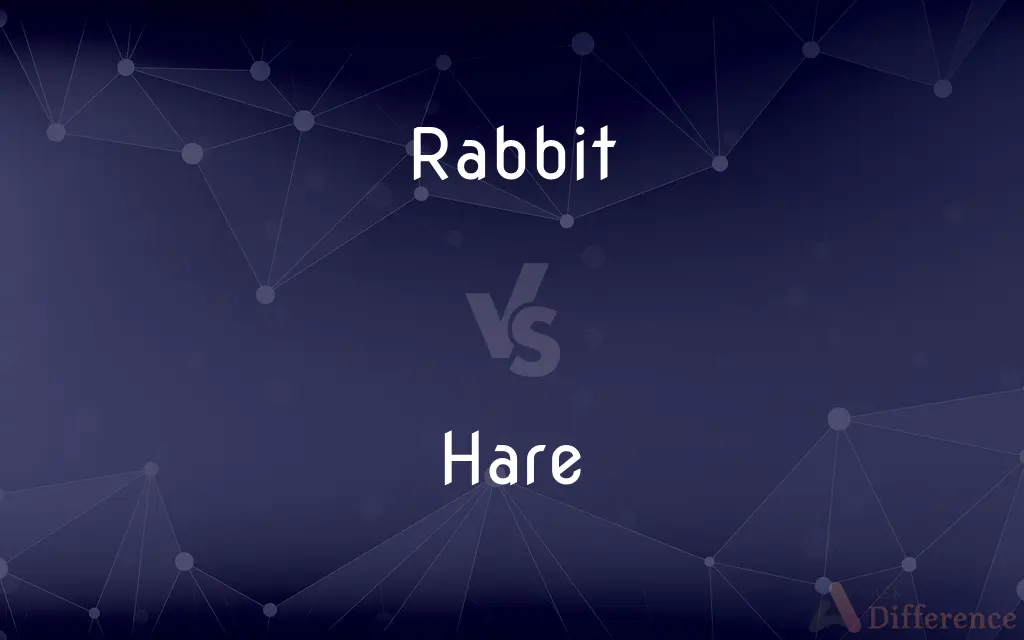Rabbit vs. Hare — What's the Difference?
Edited by Tayyaba Rehman — By Fiza Rafique — Updated on November 1, 2023
Rabbits are small mammals with short bursts of speed and underground burrows. Hares are larger, with long hind legs, live above ground, and are faster.

Difference Between Rabbit and Hare
Table of Contents
ADVERTISEMENT
Key Differences
Rabbits are small mammals with fluffy fur and long ears, known for their burrowing habits. Hares are similar in appearance but tend to be larger and faster, living primarily above ground.
While rabbits give birth to altricial (helpless) young, hares’ offspring, called leverets, are born precocial, meaning they are more developed and can move almost immediately after birth. Rabbits have a gestation period of around 30 days, and their young are born blind and hairless. Hares, on the other hand, have a gestation period of about 42 days.
The habitat of rabbits typically includes meadows, woods, forests, grasslands, deserts, and wetlands. Hares often prefer open fields where they can use their speed to escape predators.
Rabbits are social animals and live in colonies or groups, whereas hares are more solitary creatures. Rabbits rely more on hiding and less on running compared to hares, which use their powerful hind legs to escape danger.
Domestication is also a distinguishing factor: rabbits have been domesticated for many centuries, leading to numerous breeds tailored for pets or various uses. Hares have not been domesticated to the same extent and remain wild animals.
ADVERTISEMENT
Comparison Chart
Size
Smaller
Larger
Birth Status
Altricial (helpless)
Precocial (developed)
Habitat
Burrows, varied
Open fields, above ground
Social Behavior
Social, live in groups
Solitary
Domestication
Commonly domesticated
Rarely domesticated
Compare with Definitions
Rabbit
A small burrowing mammal with long ears.
The rabbit dug a burrow in the garden.
Hare
Hares are larger than rabbits and less domesticated.
Hares are often seen in the wild, but not in homes.
Rabbit
Rabbits are known for their reproductive speed.
She raises rabbits for local fairs.
Hare
A fast-running, long-eared mammal.
The hare sprinted across the field.
Rabbit
A mammal with soft fur, kept as a pet.
Their rabbit is a beloved family member.
Hare
Known for its role in fables and stories.
The tortoise and the hare raced to the finish line.
Rabbit
Rabbits are herbivorous, eating grass and vegetables.
The rabbit munched on a carrot.
Hare
A solitary animal, unlike the social rabbit.
The hare spent most of its day foraging alone.
Rabbit
Any of various long-eared, short-tailed, burrowing mammals of the family Leporidae, such as the commonly domesticated species Oryctolagus cuniculus, native to Europe and widely introduced elsewhere, or the cottontail of the Americas.
Hare
Hares and jackrabbits are leporids belonging to the genus Lepus. Hares are classified in the same family as rabbits.
Rabbit
A hare.
Hare
A fast-running, long-eared mammal that resembles a large rabbit, having very long hind legs and typically found in grassland or open woodland.
Rabbit
The flesh of a rabbit, used as food.
Hare
Run with great speed
He hared off between the trees
Rabbit
The fur of a rabbit or hare.
Hare
Any of various mammals of the family Leporidae, especially of the genus Lepus, similar to rabbits but having longer ears and legs and giving birth to active, furred young.
Rabbit
A competitor who is designated to set a fast pace for a teammate during a long-distance race.
Hare
To move hurriedly, as if hunting a swift quarry.
Rabbit
A racehorse that is run at a fast pace early in a race in order to tire the favorite so that another horse can take the lead.
Hare
Any of several plant-eating animals of the family Leporidae, especially of the genus Lepus, similar to a rabbit, but larger and with longer ears.
Rabbit
A mechanical decoy that is propelled around the track in a greyhound race to incite the dogs.
Hare
The player in a paperchase, or hare and hounds game, who leaves a trail of paper to be followed.
Rabbit
To hunt rabbits or hares.
Hare
(intransitive) To move swiftly.
Rabbit
A mammal of the family Leporidae, with long ears, long hind legs and a short, fluffy tail.
The pioneers survived by eating the small game they could get: rabbits, squirrels and occasionally a raccoon.
Hare
(obsolete) To excite; to tease, or worry; to harry.
Rabbit
(uncountable) The meat from this animal.
Hare
(regional) Grey, hoary; grey-haired, venerable (of people).
A hare old man
Rabbit
(uncountable) The fur of a rabbit typically used to imitate another animal's fur.
Hare
(regional) Cold, frosty (of weather).
A hare day
Rabbit
A runner in a distance race whose goal is mainly to set the pace, either to tire a specific rival so that a teammate can win or to help another break a record; a pacesetter.
Hare
To excite; to tease, harass, or worry; to harry.
Rabbit
(cricket) A very poor batsman; selected as a bowler or wicket-keeper.
Hare
A rodent of the genus Lepus, having long hind legs, a short tail, and a divided upper lip. It is a timid animal, moves swiftly by leaps, and is remarkable for its fecundity.
Rabbit
(comptheory) A large element at the beginning of a list of items to be bubble sorted, and thus tending to be quickly swapped into its correct position. Compare turtle.
Hare
A small constellation situated south of and under the foot of Orion; Lepus.
Rabbit
Rarebit; Welsh rabbit or a similar dish: melted cheese served atop toast.
Hare
Swift timid long-eared mammal larger than a rabbit having a divided upper lip and long hind legs; young born furred and with open eyes
Rabbit
A pneumatically-controlled tool used to insert small samples of material inside the core of a nuclear reactor.
Hare
Flesh of any of various rabbits or hares (wild or domesticated) eaten as food
Rabbit
(intransitive) To hunt rabbits.
Hare
Run quickly, like a hare;
He hared down the hill
Rabbit
To flee.
The informant seemed skittish, as if he was about to rabbit.
When the three friends heard someone behind them yell, "police, freeze!" they each rabbited in a different direction.
Hare
Hares have longer hind legs and live above ground.
A hare leaped over the bush to evade the fox.
Rabbit
To talk incessantly and in a childish manner; to babble annoyingly.
Rabbit on
Stop your infernal rabbiting! Use proper words or nobody will listen to you!
Rabbit
Confound; damn; drat.
Rabbit
Any of the smaller species of the genus Lepus, especially the common European species (Lepus cuniculus), which is often kept as a pet, and has been introduced into many countries. It is remarkably prolific, and has become a pest in some parts of Australia and New Zealand.
Rabbit
Any of various burrowing animals of the family Leporidae having long ears and short tails; some domesticated and raised for pets or food
Rabbit
The fur of a rabbit
Rabbit
Flesh of any of various rabbits or hares (wild or domesticated) eaten as food
Rabbit
Hunt rabbits
Rabbit
A symbol of fertility and rebirth in various cultures.
Rabbits are prevalent in Easter iconography.
Common Curiosities
Are rabbits domesticated?
Yes, rabbits have been domesticated and there are many breeds.
What is a rabbit?
A rabbit is a small, burrowing mammal with long ears and a short tail.
What are baby rabbits called?
Baby rabbits are known as kittens or kits.
How do hares escape predators?
Hares use their strong hind legs to run quickly and evade predators.
How do rabbits and hares differ in habitat preference?
Rabbits prefer to live in burrows while hares live above ground in nests.
Can rabbits and hares interbreed?
No, rabbits and hares are different species with different chromosomes.
Do rabbits hibernate?
No, rabbits do not hibernate.
What is a hare?
A hare is a larger, faster mammal related to the rabbit with longer hind legs and ears.
Are hares domesticated?
Hares are not typically domesticated and are found in the wild.
What are baby hares called?
Baby hares are called leverets.
What do rabbits eat?
Rabbits are herbivores, mainly eating hay, grass, and leafy greens.
Do hares hibernate?
No, hares do not hibernate but can survive in cold climates.
What do hares eat?
Hares eat similar vegetation to rabbits but can also eat more fibrous plant material.
How do rabbits escape predators?
Rabbits typically escape predators by hiding in burrows.
Are rabbits or hares more commonly kept as pets?
Rabbits are more commonly kept as pets than hares.
Share Your Discovery

Previous Comparison
Operator vs. Operation
Next Comparison
Midgey vs. MidgeAuthor Spotlight
Written by
Fiza RafiqueFiza Rafique is a skilled content writer at AskDifference.com, where she meticulously refines and enhances written pieces. Drawing from her vast editorial expertise, Fiza ensures clarity, accuracy, and precision in every article. Passionate about language, she continually seeks to elevate the quality of content for readers worldwide.
Edited by
Tayyaba RehmanTayyaba Rehman is a distinguished writer, currently serving as a primary contributor to askdifference.com. As a researcher in semantics and etymology, Tayyaba's passion for the complexity of languages and their distinctions has found a perfect home on the platform. Tayyaba delves into the intricacies of language, distinguishing between commonly confused words and phrases, thereby providing clarity for readers worldwide.















































